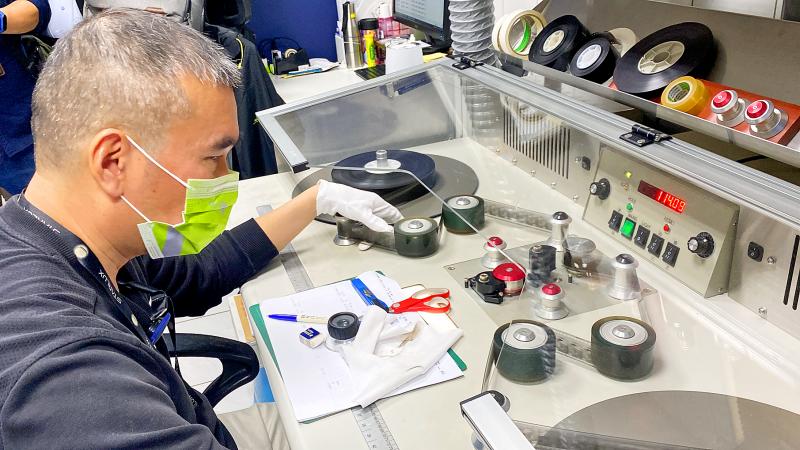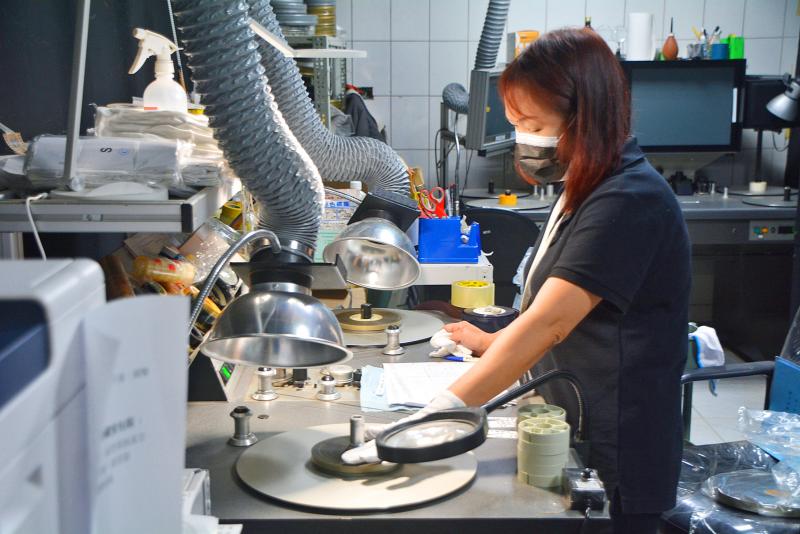“This is a reel of film that is deteriorated and brittle. It will never be brought back to life,” Taiwan Film and Audiovisual Institute (TFAI) chairman Tony Lan (藍祖蔚) said at the institute, holding aloft a canister from a collection of more than 18,000 Taiwanese movies, to help visiting lawmakers fully understand the race against time to find a new home for the institute’s film archive center.
Lan and his staff have for years been collecting and preserving copies of films made by Taiwanese directors from around the world in their archives.
However, as the institute’s hodgepodge of storage spaces are reaching capacity, there is a pressing need for a proposed purpose-built facility in New Taipei City.

Photo: CNA
Many films were in very poor condition when they were sent to TFAI’s Film Archive Center, because most people had no idea how to properly preserve them, said Tsai Meng-chun (蔡孟均), head of the center’s Film Digital Restoration section.
At the archive center, films are permanently kept in temperature-controlled rooms at either 5°C or 18°C, with humidity at 40 to 50 percent.
If a film is kept in a warm and humid environment, cellulose acetate, the base of the film, absorbs the moisture in the air and releases acetic acid. This causes the film to shrink and warp like the brittle and deteriorated reel Lan showed to the lawmakers.

Photo: CNA
A smell of vinegar permeates the storage rooms, proof that many of the films have deteriorated.
Film ages much like human beings grow old and get wrinkles, Tsai said, adding that deteriorated film is discolored and contains scratches.
While the deterioration of the film archives remains a problem, the biggest challenge facing the TFAI is a lack of space.
Since 1989, the TFAI has collected more than 18,000 copies of films.
The films, together with hundreds and thousands of movie posters, costumes and props, are stored at what TFAI director Wang Chun-chi (王君琦) called a “stopgap” archive center in an industrial cluster in New Taipei City’s Shulin District (樹林).
The center refers to 16 offices — each measuring about 330m2 — dispersed in an area packed with factories producing anything from wooden furniture to home appliances.
This arrangement is only temporary, as all but three of the offices are rented, Wang said, adding: “We have nowhere else to go.”
Before moving to Shulin, the film archive center was in another industrial cluster in Sindian District (新店).
The TFAI was forced to relocate the center, because the property owner wanted the space back, said Tsai, who began working on film archives at the TFAI in 2015.
The same concern holds for the Shulin offices.
“Every year we are worried about the property owners taking back their spaces. If they do not want to renew our leases, what are we going to do?” Tsai asked.
At the same time, the TFAI has expanded in accordance with government policy. After decades of focusing on the preservation of Taiwan’s films, the TFAI is now also tasked with collecting and handling television and radio archives.
All the offices at the archive center are almost filled to capacity, which is problematic, Tsai said, adding: “Without enough space, I cannot fetch films, even if I know there are many out there.”
In 2020, Premier Su Tseng-chang (蘇貞昌) pledged to spend more than NT$5 billion (US$168.58 million) to build the country’s first cinema museum near the TFAI building in Sinjhuang District (新莊).
The proposed museum would include a new permanent film archive center that the institute has pitched.
However, two years later there has been little progress on the proposed project. The central government and the New Taipei City Government have even spoken about the issue, blaming one another for stalling the plan.
New Taipei City Mayor Hou You-yi (侯友宜) in January urged the Cabinet to quickly approve the Ministry of Culture’s proposal to build the museum, while Su said the city government had not committed to providing the land needed for construction.
The ministry last week said that it had recently reached a deal with the New Taipei City Government to collaborate on the planned museum.
However, the ministry said the proposal was still being reviewed by the Cabinet, and that the plan, after being approved, would take an estimated seven years to complete.
Construction on the current TFAI office, which was inaugurated in January, began in 2018. Before that, talks about moving the TFAI from a mixed-use building in Taipei to its current base lasted about a decade.
Lack of space has also hampered the institute’s efforts to bring in more staff and equipment.
The section that Tsai is in charge of began working on film digitization and digital restoration in 2013, but it has only digitized about 300 films and restored fewer than 100 to date.
Digitization and digital restoration are “manual work,” Tsai said.
Before putting a roll of film into a scanner, his team must check it inch by inch to make sure that dust is removed and broken sections are repaired, Tsai said, adding that this process takes about two weeks to one month for a 90-minute movie depending on its condition.
Restoration is even more time-consuming, as one employee is capable of only processing 10 minutes of footage per month, he said.
He said that his team of 17 aims to digitize 60 films and restore at least nine movies this year.
“With our current workforce and equipment, we are not going to finish that in 100 years,” he added.
Although the TFAI began converting its archives into digital copies in 2013, it remains dedicated to preserving films, Tsai said.
The films produced by the Lumiere brothers can still be screened today, he said, referring to Auguste and Louis Lumiere, whose Workers Leaving the Lumiere Factory filmed in 1895 is considered the first motion picture in the world.
On the other hand, a digital cinema package disk, a common tool in the industry to store films in a digital format, might not work in five or 10 years if it is not preserved properly, he said.
About 55.5 percent of the films at the TFAI are dramas, while the rest are documentaries, footage of historical events and government publicity.
One of its oldest films is black-and-white footage of flocks of people with luggage arriving at a port in Keelung in 1946 and waiting to board a ship bound for Japan.
That film about the repatriation of Japanese from Taiwan after World War II documents a very important moment in the history of Taiwan that text alone cannot capture accurately, Tsai said.
These films should be preserved so that future generations will know what happened in Taiwan, he said.
“To preserve these films is to preserve history,” Tsai added.
Film archives are part of the collective memory of Taiwanese, Wang said, adding that people would face a serious existential crisis if the society they live in is deprived of shared memory.

The manufacture of the remaining 28 M1A2T Abrams tanks Taiwan purchased from the US has recently been completed, and they are expected to be delivered within the next one to two months, a source said yesterday. The Ministry of National Defense is arranging cargo ships to transport the tanks to Taiwan as soon as possible, said the source, who is familiar with the matter. The estimated arrival time ranges from late this month to early next month, the source said. The 28 Abrams tanks make up the third and final batch of a total of 108 tanks, valued at about NT$40.5 billion

Two Taiwanese prosecutors were questioned by Chinese security personnel at their hotel during a trip to China’s Henan Province this month, the Mainland Affairs Council (MAC) said yesterday. The officers had personal information on the prosecutors, including “when they were assigned to their posts, their work locations and job titles,” MAC Deputy Minister and spokesman Liang Wen-chieh (梁文傑) said. On top of asking about their agencies and positions, the officers also questioned the prosecutors about the Cross-Strait Joint Crime-Fighting and Judicial Mutual Assistance Agreement, a pact that serves as the framework for Taiwan-China cooperation on combating crime and providing judicial assistance, Liang

A group from the Taiwanese Designers in Australia association yesterday represented Taiwan at the Midsumma Pride March in Melbourne. The march, held in the St. Kilda suburb, is the city’s largest LGBTQIA+ parade and the flagship event of the annual Midsumma Festival. It attracted more than 45,000 spectators who supported the 400 groups and 10,000 marchers that participated this year, the association said. Taiwanese Designers said they organized a team to march for Taiwan this year, joining politicians, government agencies, professionals and community organizations in showing support for LGBTQIA+ people and diverse communities. As the first country in Asia to legalize same-sex

MOTIVES QUESTIONED The PLA considers Xi’s policies toward Taiwan to be driven by personal considerations rather than military assessment, the Epoch Times reports Chinese President Xi Jinping’s (習近平) latest purge of the Chinese People’s Liberation Army (PLA) leadership might have been prompted by the military’s opposition to plans of invading Taiwan, the Epoch Times said. The Chinese military opposes waging war against Taiwan by a large consensus, putting it at odds with Xi’s vision, the Falun Gong-affiliated daily said in a report on Thursday, citing anonymous sources with insight into the PLA’s inner workings. The opposition is not the opinion of a few generals, but a widely shared view among the PLA cadre, the Epoch Times cited them as saying. “Chinese forces know full well that